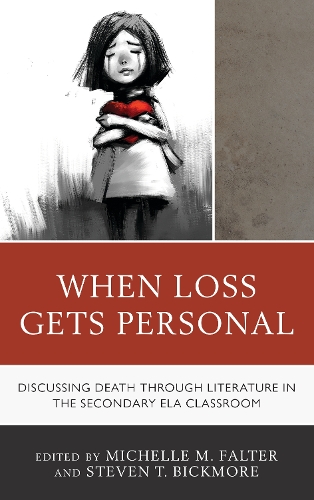
When Loss Gets Personal: Discussing Death through Literature in the Secondary ELA Classroom
(Paperback)
Available Formats
Publishing Details
When Loss Gets Personal: Discussing Death through Literature in the Secondary ELA Classroom
By (Author) Michelle M. Falter
Edited by Steven T. Bickmore
Bloomsbury Publishing PLC
Rowman & Littlefield Publishers
23rd November 2018
United States
Classifications
Professional and Scholarly
Non Fiction
Educational: Language, literature and literacy
Coping with / advice about death and bereavement
418.0071
Physical Properties
Paperback
210
Width 155mm, Height 231mm, Spine 12mm
290g
Description
When Loss Gets Personal considers how secondary English language arts teachers and teacher educators can sensitively and thoughtfully teach pieces of literature in their classrooms in which death is a significant, if not central, aspect of the texts. Death is something that affects all people young and old, yet it is rarely discussed openly in classrooms despite its prevalence in texts read in ELA classrooms. Whether it is canonical or contemporary literature, middle grades or young adult literature, fiction, nonfiction, or graphic novels, literature provides a vehicle to have difficult but needed conversations about personal deaths such as cancer, accidents, suicide, etc. Each chapter in this book focuses on 1-2 texts and provides practical activities that ask students to engage with the loss through writing assignments, projects, activities, and discussion prompts in order to build empathy, understanding, and develop critically-minded and engaged students. When Loss Gets Personal will be of interest to English language arts teachers, teacher educators, librarians, and scholars who wish to explore with their students the complex emotions that revolve around discussing deaths that occur in literature.
Reviews
This important collection of essays addresses the reality of the experience of death as an inevitable part of life and literature through rich, concrete, engaging classroom activities responding to a wide range of young adult and canonical novels. Contributors draw on their teaching experiences to describe specific methods along with extensive resources for fostering students discussions, writing, and artwork/media about characters experiences of grief, loss, depression, and mental illness associated with death and suicide. -- Richard Beach, Professor Emeritus of English Education, University of Minnesota
This book will speak to and guide teachers and teacher educators who strive to be courageous in teaching literature to young people. Falter, Bickmore, and their contributors explore critical, cutting-edge approaches to teaching literature approaches that humanize students by taking seriously their experiences with and questions about death, loss, and grief. This volume considers how suicide, terminal illness, accidents, and deaths of family members are depicted in both canonical and young adult literature. And, it offers strategies for creating interpretive spaces that foster deep engagement with these texts and the inquiries they evoke. -- Amanda Haertling Thein, Associate Dean, Academic Affairs and Graduate Programs, professor, Language, Literacy, and Culture, The University of Iowa
This text is an informative and indispensable guide for educators in creating classroom spaces that allow for the exploration of death and dying. Drawing from highly engaging young adult and commonly taught literature, these authors offer instructional methods that introduce, teach, and challenge students to consider a books emotional core.Through the use of these strategies and approaches, the creation of classroom climates where students can feel comfortable exploring and discussing death and dying can be achieved. -- Paula Greathouse, , Co-editor of Adolescent Literature as a Complement to the Content Areas series and Queer-Adolescent Literature as a Complement to the English Language Arts Curriculum; Chair of NCTEs Standing Committee Against Censorship; Assistant Professor of English Education, Tennessee Tech
Whether readers are teachers of English at the secondary or college level, or work in teacher preparation programs, they will discover thatWhen Loss Gets Personal: Discussing Death through Literature in the Secondary ELA Classroomoffers a multitude ofpractical strategies to help students reflect on personal and cultural beliefs related togrief, loss, and death. What I find energizing about this edited collection from Michelle Falter and Steven Bickmore is the variety of genres and forms of literature examined (e.g., verse novels, graphic novels, memoirs, mystery, and bildungsroman) and the diverse theoretical perspectives employed by each of the chapters authors (e.g., reader-response theory, existentialism, cultural theory, and humanistic theory). This book fills a gap in the field of English Language Arts and gives instructors a valuable set of questions, assignments, and techniques that will make hosting authentic discussions of difficult topics such as suicide, terminal illness, death, and grief more manageable and meaningful. -- Kia Jane Richmond, assistant professor of English, Northern Michigan University and chair of NCTE's Promising Young Writers Advisory Board
Author Bio
Michelle M. Falter is an assistant professor of English education at North Carolina State University. Michelles scholarship focuses on dialogic, critical, and feminist pedagogies, emotion in the teaching of literature and writing in secondary classrooms, English teacher education, and adolescent literature. She has previously co-edited the book Teaching Outside the Box but Inside the Standards: Making Room for Dialogue with Teachers College Press. Steven T. Bickmore is an Associate professor of English Education at the University of Nevada and a past editor of The ALAN Review (2009-2014). He maintains a weekly academic blog on YA LiteratureDr. Bickmore's YA Wednesday (http://www.yawednesday.com/) and his research includes how English teachers negotiate the teaching of literature using young adult literature, especially around the issues of race, class, and gender.
